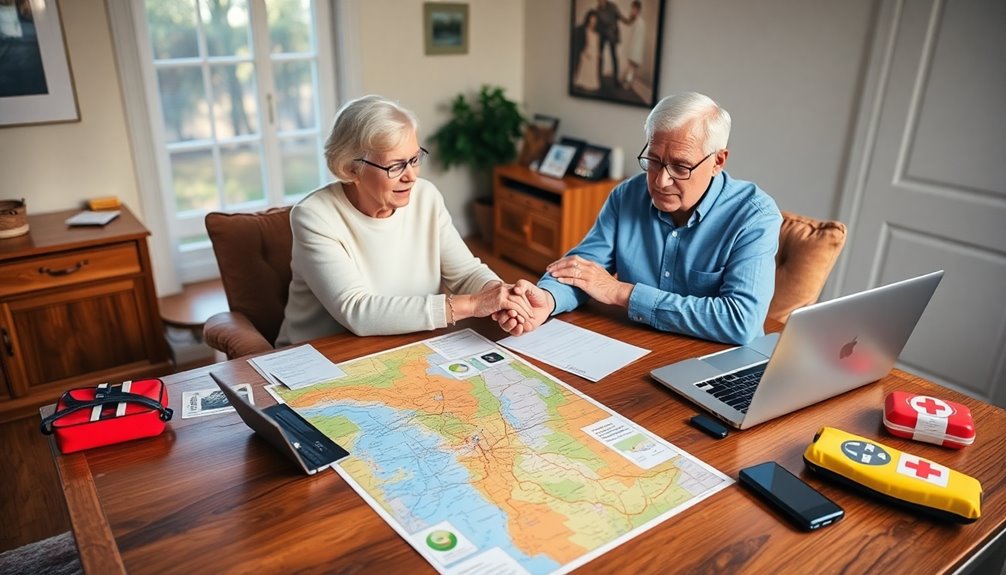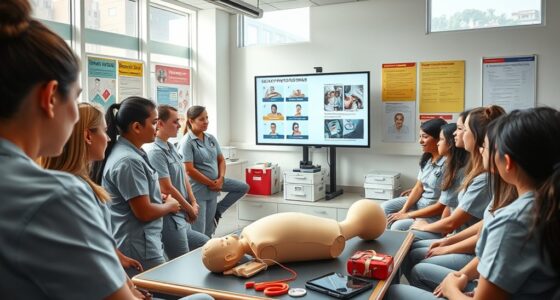Supporting your aging parents in disaster preparedness is vital. Start by engaging them in creating tailored emergency plans that address their unique health and mobility needs. Ensure they know evacuation routes and have essential supplies on hand. Regularly check and maintain their emergency kits, including communication devices. Connecting with community resources and organizations can provide additional support. By fostering a culture of preparedness together, you can enhance their safety during crises, and there's plenty more to explore on this important topic.
Key Takeaways
- Involve aging parents in creating tailored emergency plans that address their specific health and mobility needs.
- Establish clear evacuation routes and safe destinations, ensuring everyone knows where to go during a disaster.
- Maintain an updated emergency kit with essential supplies, including medications and first aid items, regularly checking its functionality.
- Create a comprehensive emergency contact list and ensure aging parents have access to communication devices for assistance.
- Engage with community resources and organizations for additional support and education on disaster preparedness specific to seniors.

As you plan for emergencies, remember that your aging parents may face unique challenges during disasters. Their health issues and mobility limitations can make them more vulnerable, so it's essential to assess their specific needs. FEMA's Disaster Preparedness Guide for Older Adults emphasizes the importance of creating a tailored emergency plan. Engage your parents in the planning process, focusing on their individual circumstances and preferences. It's crucial to recognize that individual responses vary based on their health and mobility.
It's vital to establish evacuation routes and identify safe destinations, ensuring they know where to go if disaster strikes. Economic limitations can hinder your parents' access to necessary resources. Help them gather essential supplies, such as first aid kits, flashlights, and any medications they may need. Regularly check that their emergency kits are stocked and functional. Awareness of potential risks is crucial in ensuring they understand the importance of each item in their emergency kit.
If they rely on a generator during outages, ensure it's well-maintained and ready for use. These preparations can make a significant difference in their safety and comfort during emergencies. Communication is another crucial aspect. Establish emergency contact lists and ensure your parents can access communication devices. This way, they can reach out for help if needed.
Encourage them to connect with community-based organizations that play a vital role in educating older adults about disaster preparedness. Many local groups provide resources and support specifically designed for seniors. Language accessibility can often be a barrier in disaster planning. Be proactive in finding resources available in your parents’ preferred language. This will help them understand the importance of preparedness and the steps they need to take. Consider partnering with organizations like the Rosalynn Carter Institute for Caregivers, which focuses on supporting older adults and their caregivers during emergencies. Lastly, don’t underestimate the power of community support. Additionally, many community organizations offer workshops and seminars that can provide crucial information on how to prepare for various disasters, including creating emergency kits and establishing communication plans. Sharing decor tips for elderly loved ones can also enhance their home environment, making it safer and more comfortable in case of an emergency. Engaging in these supportive activities not only boosts their preparedness but also fosters a sense of belonging and connectedness within the community.
Organize or participate in neighborhood groups that offer mutual assistance during emergencies. Maintaining registries of older adults' needs can facilitate targeted responses when disaster strikes. Utilize resources like the Eldercare Locator to find local services that can aid in recovery efforts after an event.
Frequently Asked Questions
What Are Essential Supplies for Aging Parents During Emergencies?
When preparing for emergencies, ensure your aging parents have essential supplies.
Stock a first aid kit with basic medical items, a one- to two-week supply of prescription medications, and durable medical equipment like mobility aids.
Don't forget comfort items, nonperishable foods, and plenty of drinking water.
Include personal care and hygiene products, communication tools like flashlights, and copies of important documents.
These essentials can provide security and comfort during challenging times.
How Can I Help My Parents Create an Emergency Plan?
To help your parents create an emergency plan, start by identifying potential risks in their area and understanding their specific needs.
Sit down together to outline steps for various emergencies, assigning roles for each family member. Encourage regular practice of the plan to enhance preparedness.
Make sure to gather essential contact information and keep it accessible.
Lastly, review the plan periodically to adapt it to any changing circumstances or needs.
What Local Resources Assist Seniors in Disaster Situations?
To assist seniors in disaster situations, tap into local resources like Area Agencies on Aging, which offer referrals for health support.
Community-based organizations often host emergency preparedness meetings, while local neighborhood emergency teams, such as CERT, help with planning.
Don't forget about volunteer fire departments for rural aid and faith-based organizations for community backing.
You can also connect with government resources like FEMA or the Eldercare Locator for additional assistance.
How Can Technology Aid Elderly Parents in Emergencies?
Imagine a lifeline, pulsing with technology, ready to spring into action when seconds count.
For your elderly parents, tech can be their guardian angel during emergencies. Personal Emergency Response Systems let them call for help with a simple push.
Two-way communication connects them to support, while real-time location tracking ensures help finds them fast.
With 24/7 monitoring, they can rest easy, knowing they're never truly alone in times of need.
What Should I Consider for Pets in Disaster Preparedness?
When preparing for disasters, you should consider several key factors for your pets.
Identify safe locations, like pet-friendly shelters, and develop a buddy system with neighbors for care if you're unavailable.
Ensure your pets are microchipped and keep their information updated.
Build a pet emergency kit with food, water, and medications.
Lastly, practice evacuation drills with your pets to make sure they're comfortable and ready when an emergency strikes.
Conclusion
So, while you're busy stocking up on canned beans and flashlights, don't forget your aging parents might need a little more than just a walkie-talkie and a can opener. After all, who wouldn't want to wade through floodwaters while trying to explain how to use a smartphone to Grandma? Let's face it: if we can't prepare them for a disaster, at least we can prepare ourselves for the inevitable "I told you so" when the storm hits!









